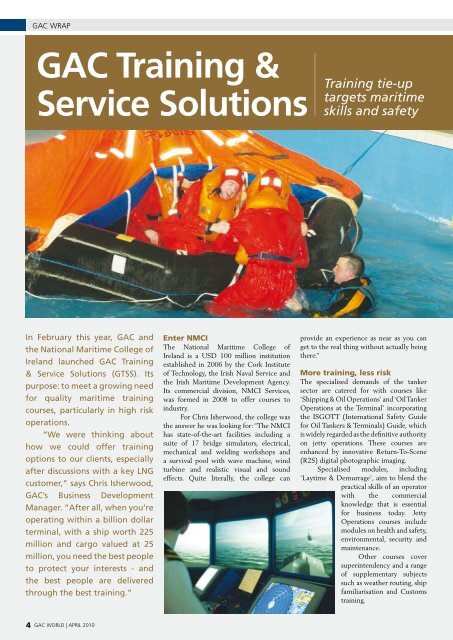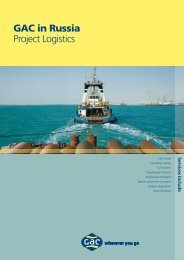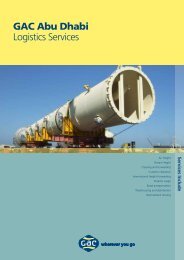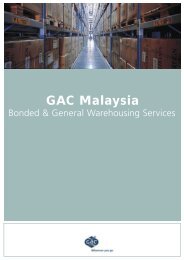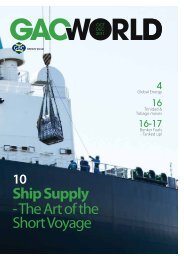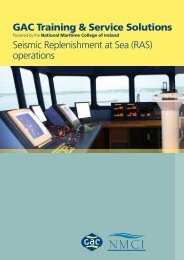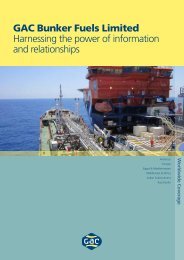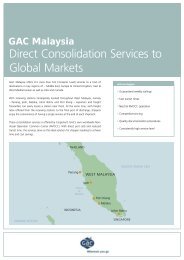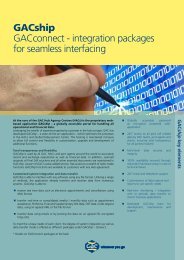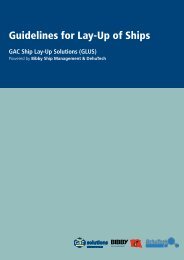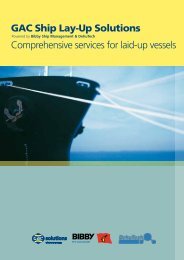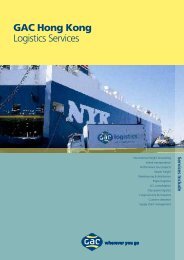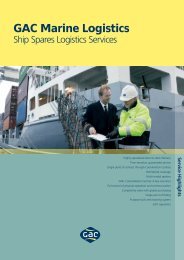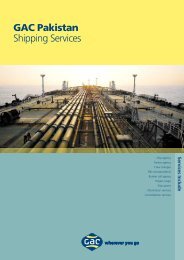The Chairman - GAC
The Chairman - GAC
The Chairman - GAC
Create successful ePaper yourself
Turn your PDF publications into a flip-book with our unique Google optimized e-Paper software.
<strong>GAC</strong> WRAP<br />
<strong>GAC</strong> Training &<br />
Service Solutions<br />
Training tie-up<br />
targets maritime<br />
skills and safety<br />
In February this year, <strong>GAC</strong> and<br />
the National Maritime College of<br />
Ireland launched <strong>GAC</strong> Training<br />
& Service Solutions (GTSS). Its<br />
purpose: to meet a growing need<br />
for quality maritime training<br />
courses, particularly in high risk<br />
operations.<br />
“We were thinking about<br />
how we could offer training<br />
options to our clients, especially<br />
after discussions with a key LNG<br />
customer,” says Chris Isherwood,<br />
<strong>GAC</strong>’s Business Development<br />
Manager. “After all, when you’re<br />
operating within a billion dollar<br />
terminal, with a ship worth 225<br />
million and cargo valued at 25<br />
million, you need the best people<br />
to protect your interests - and<br />
the best people are delivered<br />
through the best training.”<br />
Enter NMCI<br />
<strong>The</strong> National Maritime College of<br />
Ireland is a USD 100 million institution<br />
established in 2006 by the Cork Institute<br />
of Technology, the Irish Naval Service and<br />
the Irish Maritime Development Agency.<br />
Its commercial division, NMCI Services,<br />
was formed in 2008 to offer courses to<br />
industry.<br />
For Chris Isherwood, the college was<br />
the answer he was looking for: “<strong>The</strong> NMCI<br />
has state-of-the-art facilities including a<br />
suite of 17 bridge simulators, electrical,<br />
mechanical and welding workshops and<br />
a survival pool with wave machine, wind<br />
turbine and realistic visual and sound<br />
effects. Quite literally, the college can<br />
provide an experience as near as you can<br />
get to the real thing without actually being<br />
there.”<br />
More training, less risk<br />
<strong>The</strong> specialised demands of the tanker<br />
sector are catered for with courses like<br />
‘Shipping & Oil Operations’ and ‘Oil Tanker<br />
Operations at the Terminal’ incorporating<br />
the ISGOTT (International Safety Guide<br />
for Oil Tankers & Terminals) Guide, which<br />
is widely regarded as the definitive authority<br />
on jetty operations. <strong>The</strong>se courses are<br />
enhanced by innovative Return-To-Scene<br />
(R2S) digital photographic imaging.<br />
Specialised modules, including<br />
‘Laytime & Demurrage’, aim to blend the<br />
practical skills of an operator<br />
with the commercial<br />
knowledge that is essential<br />
for business today. Jetty<br />
Operations courses include<br />
modules on health and safety,<br />
environmental, security and<br />
maintenance.<br />
Other courses cover<br />
superintendency and a range<br />
of supplementary subjects<br />
such as weather routing, ship<br />
familiarisation and Customs<br />
training.<br />
<strong>GAC</strong> WORLD | APRIL 2010


